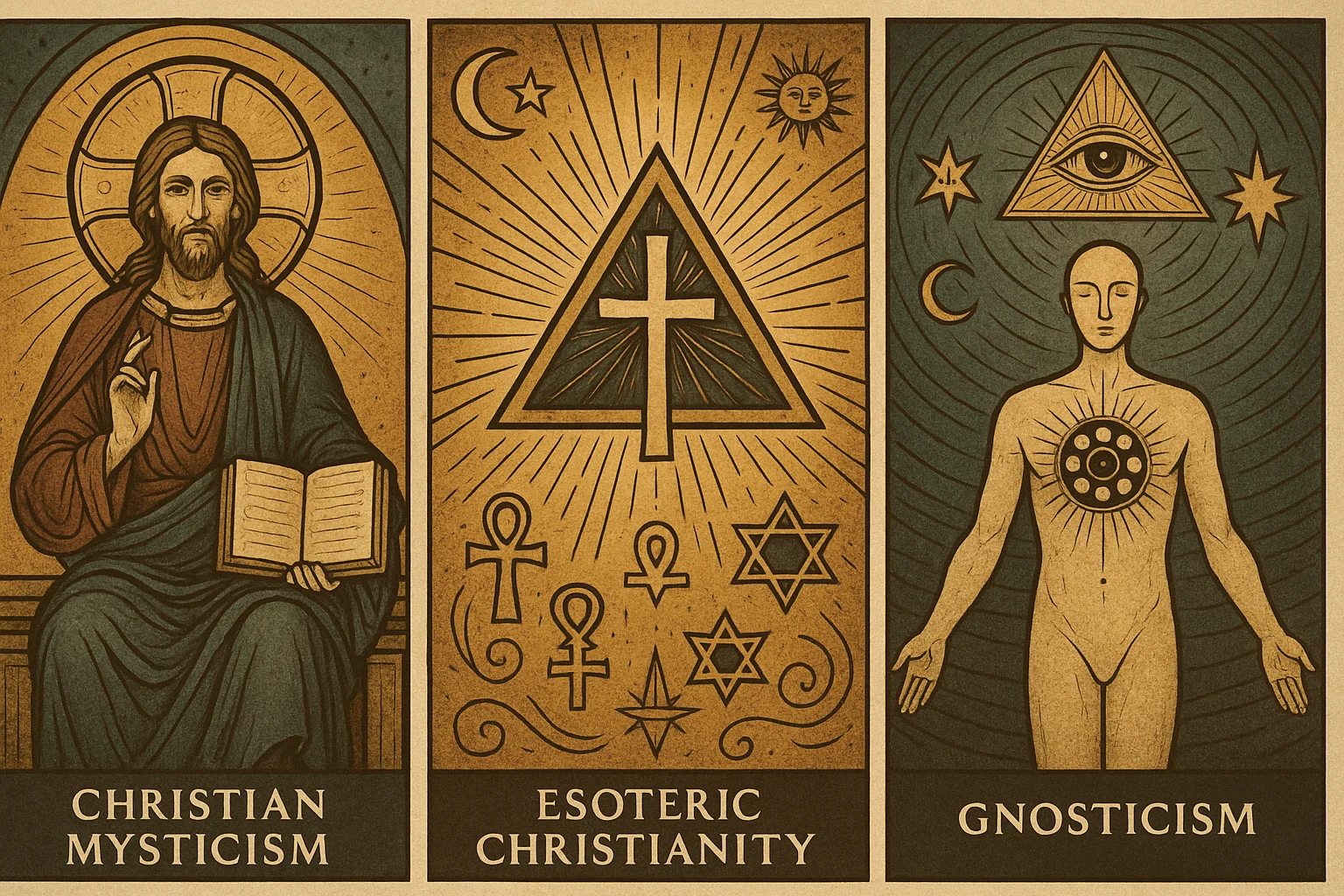Christianity and Mysticism: Exploring Esoteric and Gnostic Ideas
Christianity and mysticism represents a universal quest for union with the Divine, grounded firmly in the theological and spiritual traditions of Christianity. Esoteric Christianity, in contrast, emphasizes inner transformation either through modern spiritual teachings or ancient Orthodox contemplative practices. Gnosticism, while engaging similar themes, stands apart as a historical movement often characterized by divergent doctrines and an uneasy blending of mysticism and magic. Let’s take a deeper dive into each of these and discern for ourselves the correct path.
Understanding Christian Mysticism: A Universal Search for Union
Mysticism as the Essential Religious Experience
Mysticism, as scholars widely agree, arises from the same empirical curiosity that drives science. Both seek truth—but while science examines the external world, mysticism investigates the inner life. Across civilizations, mystics have pursued the “Absolute,” the ultimate reality underlying all existence. This quest is no mere intellectual exercise; it is practical, spiritual, and transformative. Throughout history, Christianity and mysticism have often intersected, as believers seek direct, transformative experiences of the Divine beyond intellectual understanding.
The Mystic Way: A Structured Path
Christian mysticism is not a vague, romantic ideal. It follows a well-defined path:
- Purgation – Cleansing of selfish desires.
- Illumination – Receiving spiritual insight.
- Ecstasy and Union – A profound connection with the Divine.
At each stage, the mystic applies rigorous self-discipline. This is no passive emotionalism—it is an arduous journey requiring will, love, and an active spiritual life.
Four Marks of True Mysticism
According to authoritative sources, true mysticism possesses four essential traits:
- Practicality – It changes how the individual lives.
- Spiritual Activity – Beyond thought, it demands spiritual work.
- Love – The mystic is always a lover, seeking not knowledge but union.
- Union with the Absolute – The final goal is not intellectual mastery but intimate relationship with God.
Why Christianity? The Unique Fertile Ground for Mysticism
While mysticism appears in many religions, it has found its most complete and coherent form within Christianity. Several reasons account for this:
- Neoplatonic Christian philosophy articulates and supports the mystic’s personal experiences.
- The doctrines of the Trinity and the Incarnation offer a dynamic framework for understanding both the transcendence and immanence of God.
- The Christian atmosphere encourages a balanced, fruitful development of mysticism, unlike certain non-Christian forms that tend toward either impractical transcendence or psychological excess.
- Christianity’s sacramental theology allows for both symbolic and experiential union with the Divine.
Even Christian heretical movements have drawn heavily from mysticism’s power, though often warping it into problematic forms.
The Mystic’s Vision: Beyond Psychic Phenomena
While visions and voices are common mystical phenomena, great mystics warn against trusting them too much. Authentic mystical vision is symbolic, life-enhancing, and always serves to deepen love and active spiritual engagement—not mere curiosity or power.
Esoteric Christianity: Inner Transformation, Not Hidden Knowledge
Two Streams of Esoteric Christianity
Modern discussions of “Esoteric Christianity” reveal two major interpretations:
- The Work (Modern Spiritual System)
Defines esotericism as the “inner meaning” of Christ’s teaching on personal transformation. This approach emphasizes spiritual development, not hidden doctrines or secret societies. - Eastern Orthodox Hesychasm
Rooted in the ancient tradition of Hesychia (“inner silence”), this contemplative practice involves:- Inner tranquility
- Constant prayer (especially the Jesus Prayer)
- Self-awareness and attentiveness
- Commitment to the sacred life
Both streams focus on practical inner development, entirely rejecting the idea that spiritual truth should be hidden or reserved for an elite few.
Esoteric Christianity vs. Mysticism
While Christian mysticism and Esoteric Christianity share an emphasis on personal transformation and union with the Divine, they differ in emphasis:
- Mysticism focuses on direct experience of God through a lifelong spiritual journey.
- Esoteric Christianity emphasizes understanding and applying the inner meanings of Christ’s teachings to facilitate personal growth.
Both Esoteric Christianity and mysticism, however, remain solidly within the bounds of Christian theological tradition, avoiding the pitfalls of secret knowledge or magic.
Gnosticism: Mysticism Meets Magic (And Why It Matters)
Defining Gnosticism
Gnosticism refers to a collection of religious ideas and movements from the early Christian era. Gnostics often appropriated Christian language and imagery, blending them with pre-Christian and non-Christian mystical systems.
Key features included:
- Belief in a hidden, ultimate knowledge (gnosis) necessary for salvation.
- A tendency toward dualism, viewing the material world as inherently evil.
- Use of magical practices alongside spiritual ones.
Gnosis vs. Gnosticism
It’s crucial to distinguish between gnosis (spiritual knowledge or awareness of the Divine) and Gnosticism (a particular set of historical religious beliefs and practices).
All mystics seek gnosis in the general sense—knowledge of God gained through experience.
But not all are Gnostics. In fact, most Christian mystics, from St. Teresa of Ávila to Meister Eckhart, explicitly reject the secrecy and elitism associated with Gnosticism.
Gnosticism’s Problematic Blend
Sources caution that early Gnosticism often attempted to fuse mysticism and magic—a dangerous combination. Magic seeks power and control, often at the expense of love and submission to Divine will. Mysticism, by contrast, emphasizes surrender, love, and transformation.
As a result, the early Church universally condemned Gnostic sects. Scholars suggest that much of what became Gnostic teaching arose not from an independent mystical tradition but from misinterpretations of Christian Scripture.
Key Distinctions at a Glance
| Aspect | Christian Mysticism | Esoteric Christianity | Gnosticism |
|---|---|---|---|
| Goal | Union with the Divine through love and transformation | Personal spiritual development via Christ’s teachings | Salvation through hidden knowledge |
| Approach | Practical spiritual activity, love, and self-remaking | Understanding inner meanings and cultivating inner silence | Acquisition of secret wisdom and sometimes magical power |
| Relation to Christianity | Fully integrated within Christian theology and tradition | Generally aligns with Christian teachings or ancient Orthodox practice | Often diverged from orthodoxy and was condemned as heretical |
| View of the Material World | Creation is good but fallen; can be redeemed | Material world as the arena for transformation | Often dualistic—material world as evil |
| Use of Magic/Secrecy | Rejected | Rejected | Sometimes embraced |
Conclusion: Three Roads, One Eternal Question
Christian Mysticism stands as the tried-and-true path—time-tested, theologically grounded, and centered on practical love leading to union with the Divine. It represents a spiritually sane and fruitful way that has nurtured countless saints, philosophers, and seekers.
Esoteric Christianity adds depth by exploring the inner meanings of Christ’s teachings or embracing ancient contemplative traditions. It remains, at its best, a complement to Christian mysticism rather than a competitor.
Gnosticism, for all its intriguing complexities, often strayed into secrecy, elitism, and the perilous blending of mystical ideals with magical practices. Its historical trajectory serves more as a cautionary tale than a reliable guide.
In the end, the deepest spiritual questions remain universal. How do we encounter the Divine? How do we transform? Christian mysticism and authentic esoteric Christianity offer timeless, tested answers. Gnosticism reminds us how easily human pride can lead even sincere seekers astray.

